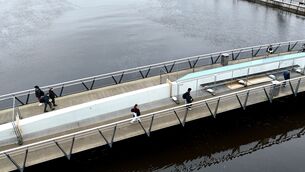Gardaí warn of accommodation fraudsters

In the case of the 20-year-old, gardaí said she travelled to the Netherlands to obtain keys for the rented property there, but the landlord failed to meet her, ignored phone calls, and ultimately blocked her number. “She subsequently learned the property was never up for rent,” gardaí said.
A 20-year-old woman was the subject of fraud when she transferred €7,400 to someone she believed was the landlord of a property, but later found the home was never for rent, gardaí have said.
An Garda Síochána has issued a warning over student accommodation fraud amid an anticipated spike from August to October.
In the case of the 20-year-old, gardaí said she travelled to the Netherlands to obtain keys for the rented property there, but the landlord failed to meet her, ignored phone calls, and ultimately blocked her number. “She subsequently learned the property was never up for rent,” gardaí said.
In another case, a 30-year-old man viewed a digital letting agency and was sent what he believed was a contract via email, which he signed, and paid €4,000 for a property in Dublin.
The lease was agreed to start on July 1 2023. When the man went to the property, there was nobody there and he was unable to contact the landlord.
Elsewhere, a 25-year-old woman transferred €1,200 over Revolut for a first month’s rent after responding to an advertisement regarding an apartment — but no keys were ever provided.
Gardaí also released details of a case study regarding a 28-year-old woman looking for a seasonal rental who contacted an agent with a UK number via Whatsapp. The agent requested a deposit of €1,236 which was transferred to a bank with a French international bank account number. The woman was then unable to make further contact with the agent.
A 21-year-old woman posted on Facebook that she was seeking student accommodation in Cork and received correspondence from a third party about what she believed was a suitable apartment. The agent requested a deposit of €800 to secure the accommodation.
Since making the transfer, she has not received keys to the apartment or any correspondence from the agent.
All these incidents were reported to gardaí in July this year.
Gardaí said while there was a 38% increase in accommodation fraud in 2022 compared to 2021, there has been a slight decrease (8%) in fraud reports to the end of June this year.
Approximately one third of all accommodation fraud occurs during August and September, with over 50% of victims of accommodation fraud aged under 25.
Approximately 55% of victims of accommodation fraud are female and around half of the incidents occur in Dublin.
€2M STOLEN
Gardaí said around €2m has been stolen in accommodation fraud in last five years.
They warn that typically forms of fraud include when the fraudster claims to be out of the country and cannot show the renter the property unless they pay a deposit.
Gardaí said fraudsters can also be living in the property when they show a number of people the home, get a deposit from several parties and disappear with the money.
Often the transaction appears normal until the renter finds that the property does not exist, is already occupied, or the keys do not work, and the landlord has disappeared.
Gardaí also warned that reservation fraud occurs when a person pays for a hotel/guesthouse room and subsequently discovers that the transaction was fraudulent, for example, the property does not exist, or staff at the property have no record of the booking.
The Garda National Economic Crime Bureau has issued advice and warning signs when looking for rented accommodation.
Warning signs include when payment is demanded before signing the lease or when a renter is asked to pay cash, cryptocurrency, or money via a non-bank transfer.
Gardaí advised renters never to agree to rent a property without first having the opportunity to view it, to ensure that the keys work, and they have proper contact details for the landlord/agent — which would ideally be registered with the Residential Tenancies Board.










 App?
App?


